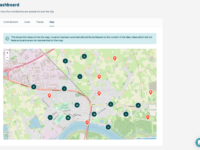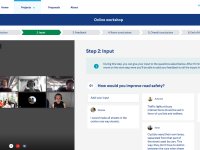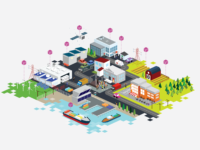The Scenario Exploration System was developed to facilitate the application of futures thinking to policy-making originally geared at engaging EU policy-makers with foresight scenarios very easily.
The tool operates as a multi-role board game that makes participants naturally grasp complex opportunities and constraints in a future-oriented perspective. Never before had a tool been able to facilitate the uptake of foresight for policy-making and systemic thinking to such an extent.
Country: Belgium
Citizen workshops are an essential piece of our local democracies. They allow live interactions, in-depth discussion, and help consensus emerge. Up until now, they were being held offline, whilst online platforms are usually reserved for indirect and asynchronous participation - think voting, surveys or participatory budgeting. However, the current crisis has made these essential in-person meetings impossible.
CitizenLab's workshop feature has been designed to expand the scope of online…
Covid-19 Response
Brussels citizens and social economy actors produce 100.00 protection masks for non medical workers
The Brussels-Capital Region, together with a number of civil society organisations and (social economy) enterprises, launched a participatory initiative aiming to produce at least 100 000 protection masks for nursing personnel/caregivers. The work integration enterprise Travie ensures the pre-cutting of tissue which will then be delivered by bike through the platform cooperative Urbike to volunteers who will then sew the masks. Next to many citizens, a number of other organisations and…
It is currently difficult for the public to follow how EU laws are made. This is because the Council - where Member States are represented - remains relatively inaccessible. Documents are difficult to get hold of and Member States’ positions on a given law are not public. The EO opened an own-initiative inquiry into Council legislative transparency and has called for a series of transparency steps to be taken.
En 2015, le Parlement de Wallonie a engagé une réforme de son Règlement ayant notamment pour objectif d’associer davantage les citoyens wallons au travail législatif des députés.
Dans ce cadre, plusieurs dispositifs ont été mis en place dont la plateforme "Un décret par tous, un décret pour tous" qui vise à encourager les citoyens à intervenir directement dans la rédaction d’un décret sur base d’une problématique soulevée par un député.
Case Study
Unlocking the potential of crowdsourcing for public decision-making with artificial intelligence

In citizen participation projects, analysing contributions is often a huge challenge for administrations.
CitizenLab has developed machine-learning algorithms in order to help civil servants easily process thousands of citizen contributions and efficiently use these insights in decision-making.
The dashboards on our platform classify ideas, show what topics are emerging, summarise trends and cluster similar contributions by theme, demographic trait or location.
The European Citizens’ Consultations (ECCs) were a project aiming to engage citizens in a consultation about what Europe meant to them. It was formed of two strands; an online survey about the future of Europe, and a series of national consultation events organised by national governments and other organisations like NGOs, think tanks, and academic institutions. This was a new experiment to give European citizens the possibility to express and exchange their opinions about the Union and its…
The European Commission led #Blockchain4EU as a forward-looking exploration of existing, emerging and potential Blockchain and other DLTs (Distributed Ledger Technologies) applications for industrial sectors. Through an experimental and participatory approach, this project allowed first to come up with an overview of promising applications across industries, and second to co-design five prototypes that physically showcase how Blockchain could be applied in the near future.
En 2015, le Parlement de Wallonie a engagé une réforme de son Règlement ayant notamment pour objectif d’associer davantage les citoyens wallons au travail législatif des députés.
Dans ce cadre, plusieurs dispositifs ont été mis en place dont la modernisation et le renforcement du droit de pétition qui permet aux citoyens de déposer et soutenir des pétitions par voie électronique.
Il s’agit d’un projet novateur pour le Parlement qui se veut plus que jamais ouvert et à…
Under the Fast-Track procedure for access to EU documents complaints, the EO aims to take a position within two months on whether the document should be released to the complainant by the EU administration. This represents a substantial Ombudsman reduction in inquiry time, achieved by creating a separate dedicated team to process these complaints quickly. The aim is to increase the chances of complainants getting information while it is still relevant and useful.




